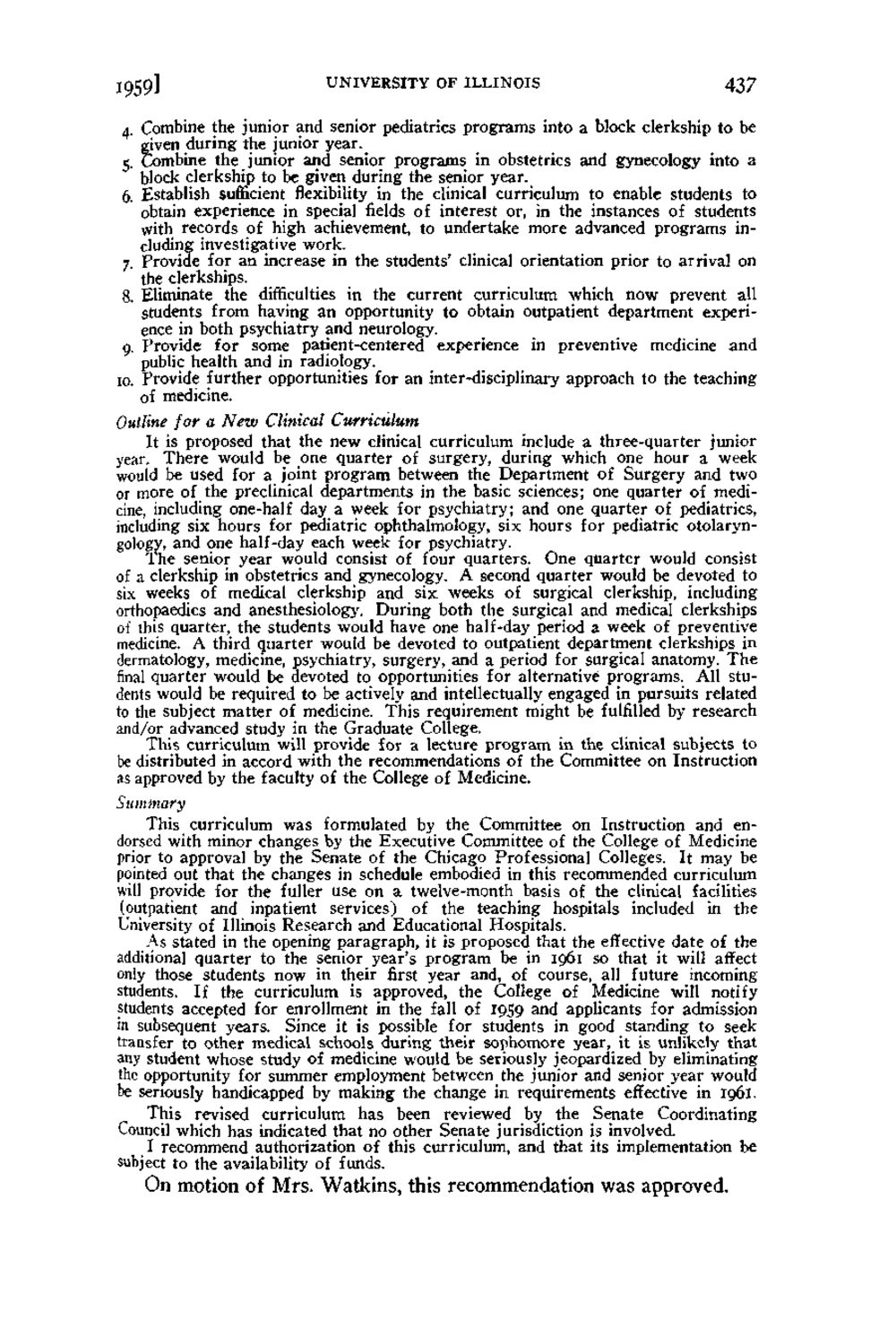| |
| |
Caption: Board of Trustees Minutes - 1960
This is a reduced-resolution page image for fast online browsing.

EXTRACTED TEXT FROM PAGE:
1959] UNIVERSITY OF ILLINOIS 437 4. Combine the junior and senior pediatrics programs into a block clerkship to be given during the junior year. 5. Combine the junior and senior programs in obstetrics and gynecology into a block clerkship to be given during the senior year. 6. Establish sufficient flexibility in the clinical curriculum to enable students to obtain experience in special fields of interest or, in the instances of students with records of high achievement, to undertake more advanced programs including investigative work. 7. Provide for an increase in the students' clinical orientation prior to arrival on the clerkships. 8. Eliminate the difficulties in the current curriculum which now prevent all students from having an opportunity to obtain outpatient department experience in both psychiatry and neurology. 9. Provide for some patient-centered experience in preventive medicine and public health and in radiology. 10. Provide further opportunities for an inter-disciplinary approach to the teaching of medicine. Outline for a New Clinical Curriculum It is proposed that the new clinical curriculum include a three-quarter junior year. There would be one quarter of surgery, during which one hour a week would be used for a joint program between the Department of Surgery and two or more of the preclinical departments in the basic sciences; one quarter of medicine, including one-half day a week for psychiatry; and one quarter of pediatrics, including six hours for pediatric ophthalmology, six hours for pediatric otolaryngology, and one half-day each week for psychiatry. The senior year would consist of four quarters. One quarter would consist of a clerkship in obstetrics and gynecology. A second quarter would be devoted to six weeks of medical clerkship and six weeks of surgical clerkship, including orthopaedics and anesthesiology. During both the surgical and medical clerkships of this quarter, the students would have one half-day period a week of preventive medicine. A third quarter would be devoted to outpatient department clerkships in dermatology, medicine, psychiatry, surgery, and a period for surgical anatomy. The final quarter would be devoted to opportunities for alternative programs. All students would be required to be actively and intellectually engaged in pursuits related to the subject matter of medicine. This requirement might be fulfilled by research and/or advanced study in the Graduate College. This curriculum will provide for a lecture program in the clinical subjects to be distributed in accord with the recommendations of the Committee on Instruction as approved by the faculty of the College of Medicine. Summary This curriculum was formulated by the Committee on Instruction and endorsed with minor changes by the Executive Committee of the College of Medicine prior to approval by the Senate of the Chicago Professional Colleges. It may be pointed out that the changes in schedule embodied in this recommended curriculum will provide for the fuller use on a twelve-month basis of the clinical facilities (outpatient and inpatient services) of the teaching hospitals included in the University of Illinois Research and Educational Hospitals. As stated in the opening paragraph, it is proposed that the effective date of the additional quarter to the senior year's program be in 1961 so that it will affect only those students now in their first year and, of course, all future incoming students. If the curriculum is approved, the College of Medicine will notify students accepted for enrollment in the fall of 1959 and applicants for admission in subsequent years. Since it is possible for students in good standing to seek transfer to other medical schools during their sophomore year, it is unlikely that any student whose study of medicine would be seriously jeopardized by eliminating the opportunity for summer employment between the junior and senior year would be seriously handicapped by making the change in requirements effective in 1961. This revised curriculum has been reviewed by the Senate Coordinating Council which has indicated that no other Senate jurisdiction is involved. I recommend authorization of this curriculum, and that its implementation be subject to the availability of funds. On motion of Mrs. Watkins, this recommendation was approved.
| |